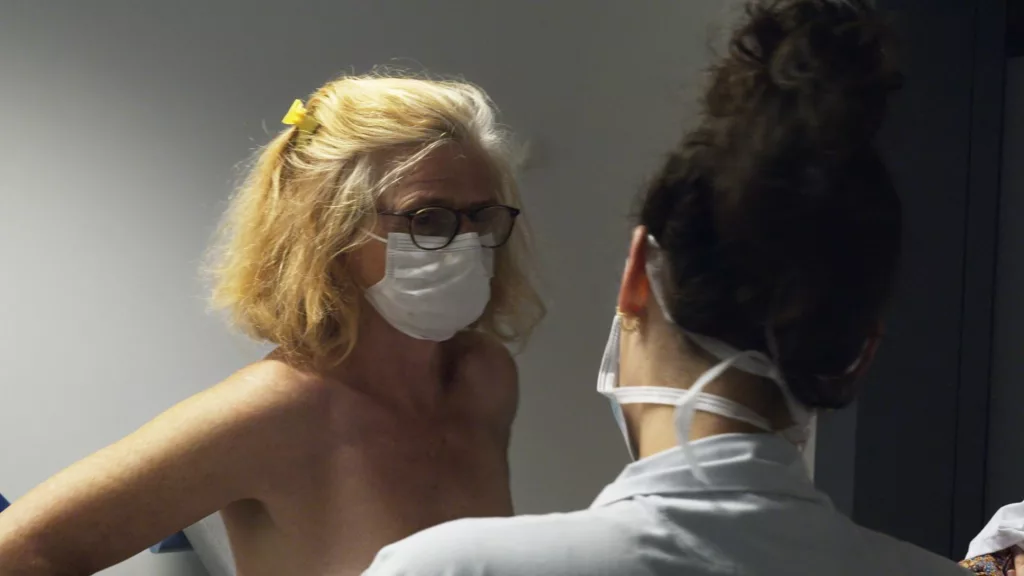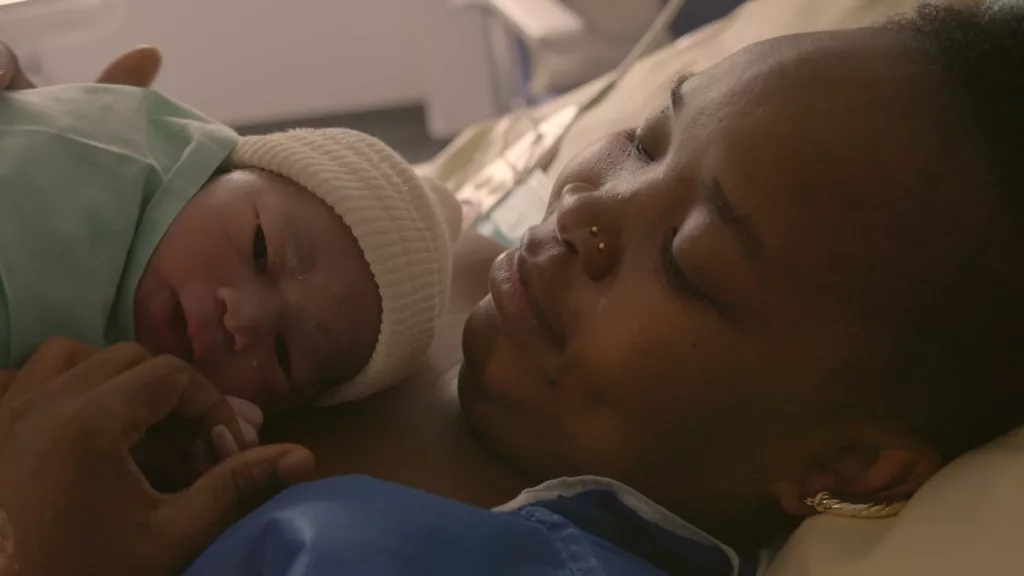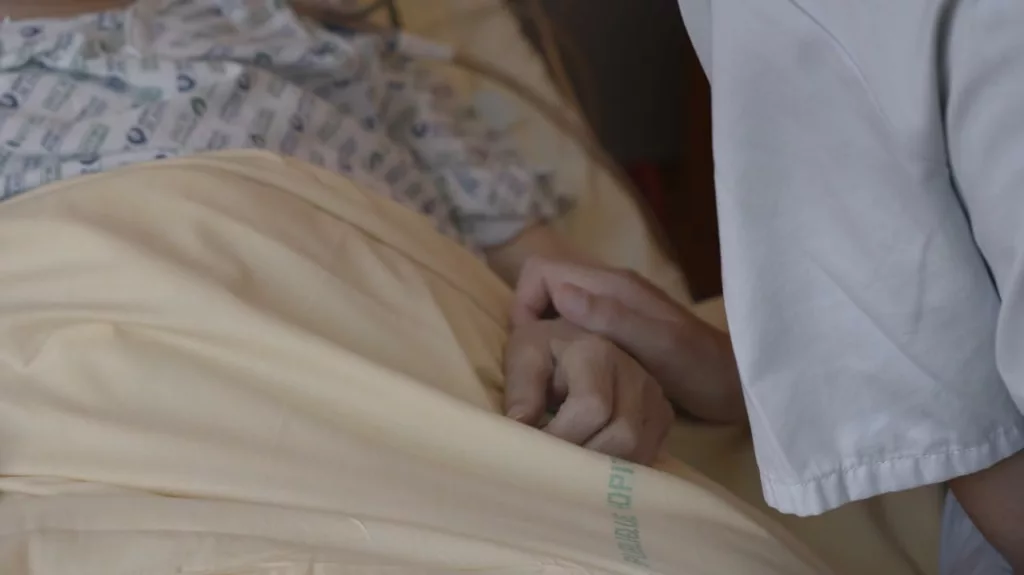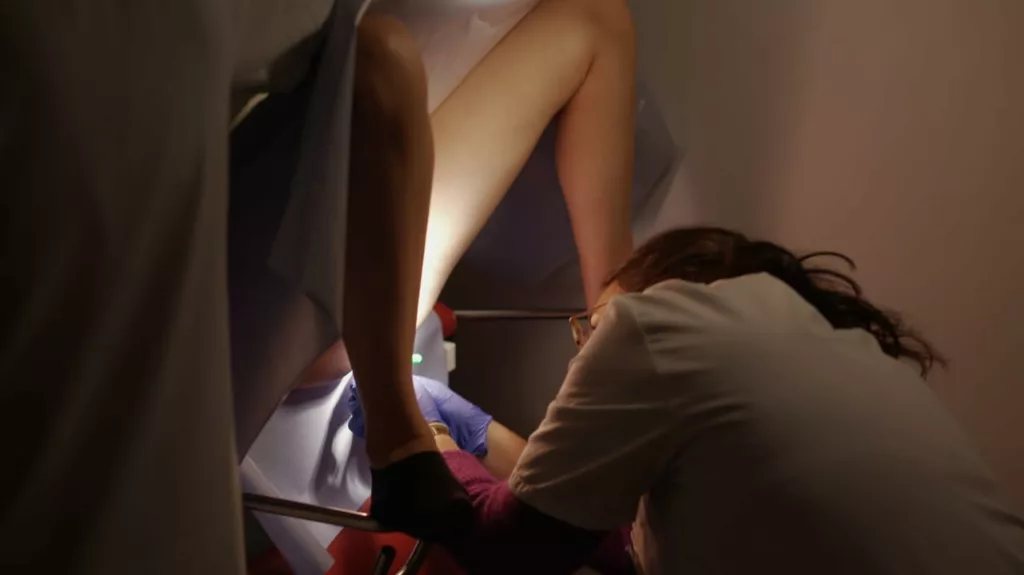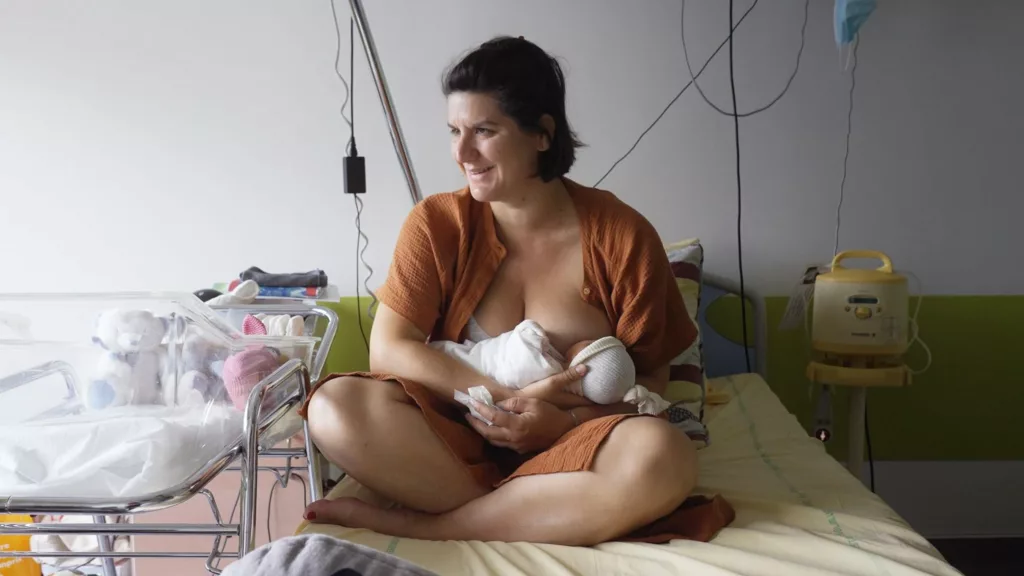The latest cinematic opus from acclaimed French filmmaker Claire Simon, “Our Body,” stands as a revelatory, intimate exploration of the experiences surrounding the female form. Simon’s unflinching documentary immerses viewers deep within the halls and examination rooms of a Parisian public hospital. There, a raw, vérité narrative unfurls, casting an uncompromising gaze upon the diverse realities of womanhood – from the rites of fertility and childbirth to the cruel ravages of disease.
With her signature empathetic curiosity and meticulous observational approach, Simon assembles a profound tapestry of the corporeal journeys undertaken by a multitude of women across all ages and backgrounds. What emerges is a work of startling authenticity that demystifies long-held stigmas while paying reverence to the resilience and dignity embodied within the female condition.
Immersive Journey Through the Female Experience
Claire Simon’s documentary “Our Body” takes viewers on an immersive, unflinchingly intimate journey through the inner sanctums of a Parisian gynecological hospital. From the hushed whispers of consultation rooms to the controlled chaos of operating theaters, Simon trains her insightful lens on the harrowing yet inspiriting experiences that encompass the full spectrum of womanhood.
The film proceeds in an episodic vérité style, fluidly transitioning between vignettes that lay bare the profound vulnerabilities faced by its subjects. We bear witness to the furrowed brows of anxious adolescents grappling with crisis pregnancies and gender transitions. The camera does not flinch from capturing the raw physicality of natural childbirths and surgical procedures with forthright clarity.
Yet Simon’s fly-on-the-wall approach extends far beyond mere clinical observation. Her profound humanism shines through in tender interpersonal moments – an affirming smile, a reassuring caress, a sharing of hard-won wisdom between caregiver and patient. The remarkable openness and candor on display fosters an aura of intimacy, dissolving societal boundaries to reveal our universally shared embodied existence.
As “Our Body” progresses, Simon’s vision expands from the specific to the universal, meditating on fundamental questions of agency, dignity, and what it means to inhabit a female form in the modern world. The result is a multifaceted, thought-provoking tapestry that both celebrates and laments the myriad complexities of the human condition.
Masterful Cinéma Vérité Vision
Claire Simon’s “Our Body” stands as a masterwork of contemporary cinéma vérité, employing an exquisitely understated yet profoundly affecting fly-on-the-wall aesthetic. In the tradition of pioneers like Frederick Wiseman, Simon’s unobtrusive directorial hand allows the innate drama of lived experiences to organically unfurl before the camera’s unwavering gaze.
The film’s camerawork and editing (by Luc Forveille) imbue each scene with a strikingly intimate yet respectful tenor. Shots linger in hushed examination rooms, allowing an eavesdropper’s perspective into the most private of conversations between patients and caregivers. The camera’s subtle reframings and judicious use of close-ups accentuate the emotive weight of furrowed brows, trembling hands, and hopeful glances exchanged.
Yet Simon’s technique extends beyond the purely observational. Much like Wiseman’s seminal institutional studies, “Our Body” possesses an undercurrent of rhetorical force driven by the curated narrative constructed through editing. Transitions are deftly orchestrated, with one subject’s profound story seamlessly giving way to the next in a rhythmic cinematic tapestry.
The end result is an immersive, lived-in ambiance that transports viewers into the inner sanctums of the gynecological hospital. Simon’s directorial restraint and vérité approach paradoxically allow the full visceral weight of each woman’s journey to be felt without adornment or melodrama. The rawness of both joyous and harrowing moments acquires an experiential authenticity rarely achieved on film.
In bridging the intimate and the universal, Simon has created a cinematic experience that both lays bare unvarnished human truths while elevating the shared corporeal struggles of womanhood to poetic, philosophical heights. It is a vérité manifesto for the essence of the female form.
Revelatory Embodiment of Womanhood
At its core, “Our Body” serves as a profound reclamation and reframing of the female form – one that cuts against centuries of patriarchal objectification, stigmatization, and oppressive societal mythologies. Claire Simon’s documentary executes this revelatory embodiment of womanhood through an unflinching yet empathetic portrayal of the diverse physical realities her subjects confront.
From the outset, Simon demystifies and destigmatizes aspects of feminine embodiment that have long remained shrouded in silence and taboo. Reproductive health consultations, abortion procedures, and natural childbirths are captured with unshrinking transparency and dignity. There is a palpable aura of respect and validation permeating these sequences – an ethos extended even to transgender subjects on their own unique journeys of corporeal self-actualization.
The blunt, often graphic physicality on display throughout “Our Body” takes on a revolutionary tenor in its normalization of female anatomy and sexual health. No longer are these core aspects of womanhood couched in euphemism or obscured behind clinical dispassion. Instead, they are presented as fundamental to the lived human experience, worthy of empowered understanding rather than stigma or ignorance.
This radical candor segues into the film’s broader ruminations on medical ethics, patient rights, and the imbalances of power and agency that persist within institutional healthcare. Simon does not shy away from portraying moments where a woman’s bodily autonomy is subverted or her voice marginalized by a callous or indifferent medical professional. Their plight is counterbalanced, however, by the film’s overriding portrait of the compassionate nurses, doctors, and staff who walk a challenging tightrope between clinical detachment and steadfast advocacy.
In this duality of experiences, “Our Body” locates its greatest socio-political resonance. At a time when women’s fundamental rights over their own biology are under renewed assault through regressive ideologies and policies, Simon’s documentary serves as an exhortation for empowerment, education, and a recalibration of institutional hierarchies. The universality of her subjects’ journeys highlights an inexorable truth – that progress toward true gender equality remains inextricably linked to securing unfettered bodily autonomy for all women, regardless of age, race, orientation or creed.
Embark on a journey of self-discovery in our Simon of the Mountain review. Follow Simon as he finds belonging among a community of mentally disabled youth in remote Argentina. Learn how this intimate film explores themes of identity, communication, and acceptance with empathy and authenticity.
Director’s Transformative Ordeal
Perhaps the most profound and haunting throughline in “Our Body” emerges when director Claire Simon herself is diagnosed with breast cancer over the course of filming. What began as an exercise in demystifying female embodiment through the exquisitely drawn portraits of others is suddenly rendered infinitely more visceral and personal.
Simon’s transformation from omniscient observer into an observed subject represents a pivotal narrative inflection point. There is an inescapable symbolism and poignancy to this revelation – the notion that the very act of immersing herself into this feminine realm of hospitals and bodily ordeals has metaphysically inducted her into the sobering realities she had initially set out to document.
In the sequences where Simon undergoes her own medical screenings and procedures, the veil of the artist’s distanced authorial perspective is unceremoniously rent away. We bear witness not just to the vulnerability of womanhood, but to the vulnerability of a creator laying bare their own fragile corporeality before the camera’s unblinking lens.
Simon’s searingly intimate directorial choice elevates “Our Body” from a work of vérité observation into something far more universal and transcendent. Her personal hardship becomes inextricably intertwined with those of her subjects, forming an ouroboros of shared struggles against mortality and the frailties of the flesh.
The emotional impact is profound – we the audience see not just the literal bodies on screen, but our own temporality and innate susceptibility to the vagaries of biology reflected back at us. “Our Body” ceases to be merely a documentary and instead becomes an existential meditation on what unites and underpins the entirety of lived human experience.
Transcendent Humanity On Display
While Claire Simon’s authorial presence looms large over “Our Body,” the true heart and soul of the documentary reside within the multitudes of profound personal journeys rendered on screen. From pensive adolescents to wise elders, the film presents an incredibly diverse tapestry of individuals whose openness and resilience in the face of life’s profound challenges prove utterly transcendent.
Among the many indelible figures is the teenage Muslim girl whose crisis pregnancy becomes not just a medical scenario, but a crucible that lays bare complexities of faith, family expectations, and the all too common stigmas surrounding female sexuality. Her vulnerability and trepidation are palpable, handled with remarkable empathy by the caring physician guiding her through her options.
On the other end of the age spectrum is the elderly cancer patient whose body has finally betrayed her despite an indefatigable will to fight. Watching her confront the reality of palliative care with a caregiver’s tender embrace is a harrowing portrait of human fragility – and the compassion that can provide solace in one’s final days.
Between these narrative poles, a full spectrum of universal experiences manifests. The film documents the full circle of womanhood – from the agonies of youth’s stumbles into sexual awakening to the profound elation of natural childbirth to the bittersweet biological rituals of gender transitions and menopause.
What renders these sequences so profoundly affecting is the sheer diversity of backgrounds and perspectives on display. The panoply of Simon’s subjects reflects a true cross-section of the modern feminine experience across races, cultures, and socioeconomic strata.
Yet throughout these varied narratives, a common throughline of humanity shines through – an appreciation for the bravery, humor, and indefatigable spirit exhibited by those undertaking the most formidable challenges life can conjure. In chronicling both joy and suffering with empathetic transparency, “Our Body” stands as a celebration of the quiet dignities and triumphs undertaken every day within the world’s hospitals and birthing rooms.
Unforgettable Corporeal Enlightenment
In the vast canon of vérité documentary cinema, few works have exhibited the profound enlightening power of Claire Simon’s “Our Body.” With an unflinching yet tender authorial lens, Simon has created a revelatory uber-text on the innumerable complexities and indignities that comprise the feminine embodied experience.
Over the course of its expansive yet essential runtime, “Our Body” takes viewers on an emotionally seismic journey – one that lays bare the full visceral spectrum of the human condition. Simon deftly balances the clinical and the metaphysical, the joyous and the tragic, the empowering and the harrowing. Each individual portrait and personal ordeal contributes to a symphonic exploration of womanhood in both its most transcendent and most lamentable iterations.
Yet what emerges most powerfully is an overriding message of perseverance, resilience, and the quiet dignities undertaken each day by those for whom the battle to maintain bodily autonomy and existential selfhood is a perpetual struggle. In elevating her subjects’ souls to the same rarefied plane as their corporeal vessels, Simon has crafted a work of startling intimacy and authenticity.
Much like the ouroboros snake of ancient mythology eternally renewing itself, “Our Body” represents both an ending and a beginning – a mournful elegy for societal oppression and medical injustice as well as a celebratory paean to reclaimed feminine agency. The lasting impact is akin to a spiritual unburdening, leaving the viewer profoundly and permanently attuned to the awe-inspiring realities of inhabiting a human form.
The Review
Our Body
Claire Simon's "Our Body" is a towering, peerlessly insightful achievement in vérité documentary filmmaking. By immersing viewers with unwavering intimacy into the innermost sanctums of female embodied experiences, Simon has created a work of searing authenticity that both enlightens and inspires visceral awe. Her ability to elevate quotidian medical realities to transcendent philosophical heights, while maintaining an empathetic witness to the trials and triumphs of her subjects, is nothing short of masterful. Though the subject matter can prove harrowing at times, Simon's deft hand maintains an overriding atmosphere of reverence, humanity and hardwon perseverance. "Our Body" stands as an essential filmic text on bodily autonomy, healthcare injustice, and the protean resilience of the feminine spirit. An unforgettable tour de force.
PROS
- Unflinching, intimate portrayal of female embodiment
- Diverse representation of experiences across ages, backgrounds
- Raw authenticity in capturing joyous and harrowing medical realities
- Empathetic treatment of subjects, spotlighting resilience and dignity
- Powerful social commentary on bodily autonomy and healthcare justice
- Innovative stylistic approach blending vérité and autobiographical elements
- Simon's own cancer journey adds profound emotional resonance
- Demystifies longstanding taboos surrounding female health and sexuality
- Poetic philosophical exploration of the human condition
CONS
- Extended 3-hour runtime may test some viewers' endurance
- Graphic medical procedures could prove too visceral for the squeamish
- Lack of insight into personal lives of hospital staff and caregivers
- Episodic narrative structure leaves some stories feeling unresolved









































